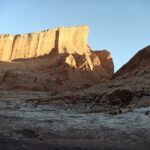 In 2010 Phil and I went to the Atacama Desert in Chile. Not your usual holiday destination of course, but this was a working trip for Phil to Santiago, Chile, and I had the opportunity to travel with him. We spent several days in the desert, walking Rainbow Valley and the Valle de La Luna where the moon landings were trialed (2,250 meters above sea level), enjoying the hot springs in the desert, observing the night sky, the sunsets, the extinct volcanoes and enduring the vast differences in temperatures between night and day. It was a very memorable trip. Now, if you tell someone that you were to holiday in the desert, they might think that you were slightly crazy. But the desert is beautiful and magical. The colours of the rocks, earth and sand dunes are breath taking. It can be a place of stillness.
In 2010 Phil and I went to the Atacama Desert in Chile. Not your usual holiday destination of course, but this was a working trip for Phil to Santiago, Chile, and I had the opportunity to travel with him. We spent several days in the desert, walking Rainbow Valley and the Valle de La Luna where the moon landings were trialed (2,250 meters above sea level), enjoying the hot springs in the desert, observing the night sky, the sunsets, the extinct volcanoes and enduring the vast differences in temperatures between night and day. It was a very memorable trip. Now, if you tell someone that you were to holiday in the desert, they might think that you were slightly crazy. But the desert is beautiful and magical. The colours of the rocks, earth and sand dunes are breath taking. It can be a place of stillness.
Many individuals in the Bible accounts had key times when they experienced life in the desert. I think of Abraham, Moses, Elijah and of course Jesus himself. Times when they were isolated or wandering in these arid, bare, wilderness places- times which dramatically shaped and transformed their lives.
In 1 Kings we read that Elijah spent several periods in the desert or wilderness. He had challenged the evil King Ahab and his Queen Jezebel about their Baal worship. Consequently, God sent drought and famine for a period of years.
God instructed Elijah to go to the Brook Cherith in the wilderness where he would be fed by the ravens. His desert stay was a place of rescue, hiding, safety, protection, and stillness. A place of quiet and hiddenness.
God then sent Elijah to Zarephath where he, the woman and her son would be cared for and miraculously provided for, as protection from the intense three-year drought and famine. The desert was his place of refuge, rest, and recovery and provision. God had pressed the pause button for Elijah.
After Elijah returned to challenge King Ahab and Elijah’s victory over the prophets of Baal, Elijah once again ran to the desert in fear for his life. Elijah had been hounded, hunted, and was in a place of exhaustion, isolation, and depression. Sitting under his broom bush, the desert was a place of despair. But it became the place of grace, re-setting, reassurance, and recommissioning. Elijah was not left in solitary isolation. After declaring to God, “only I am left!” he is reassured that there are 7,000 men who have not worshipped Baal. He is not alone. And then the rains come. The drought is over.
The desert or wilderness can be beautiful, providing lessons that perhaps cannot be learned elsewhere. We should not be afraid of the desert. There is water in the desert.
“Forget the former things;
do not dwell on the past.
19 See, I am doing a new thing!
Now it springs up; do you not perceive it?
I am making a way in the wilderness
and streams in the wasteland.
20 The wild animals honour me,
the jackals and the owls,
because I provide water in the wilderness
and streams in the wasteland,
to give drink to my people, my chosen,
21 the people I formed for myself
that they may proclaim my praise.
Isaiah 43 v 18-21
A prayer… Father God
I want to stop and be still. The world is a noisy and distracting place.
Help me not to be alarmed by the lonely place, the dark place, the wilderness and the desert. You are there with me. You will never leave me.
What feels like a wasteland, can be turned into a place of plenty.
You will hide me and shelter me. You make a way in the desert places.
Amen
Jane Coates

